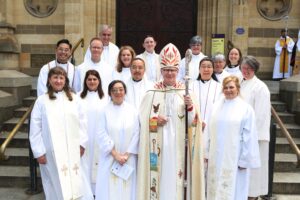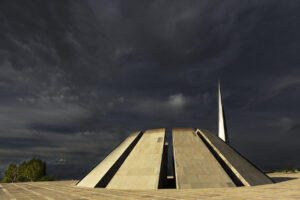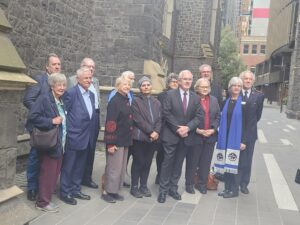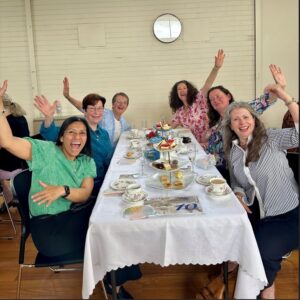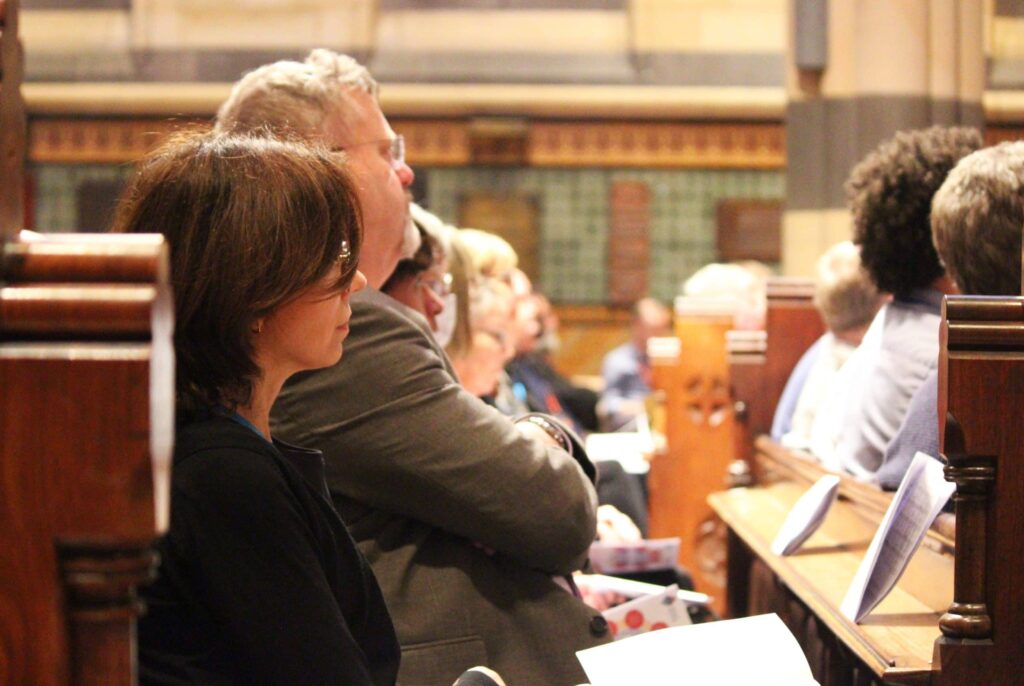
10.15pm
Elspeth Kernebone signing off. Thank you for joining me tonight! Key issues from the evening have been:
A committee will consider a five-day working week for full time clergy in the Diocese of Melbourne after synod endorsed a motion calling for a review of clergy working hours.
- The motion requests Archbishop in Council form a working group to consider alternate models of providing Anglican healthcare chaplaincy and continuity of care for vulnerable people, and alternative funding models.
- Further consideration of a motion relating to recognition of Aboriginal and Torres Strait Islander Anglicans in Victoria has been deferred until Saturday to allow for further discussion, after two amendments to the motion passed.
In the last few minutes, the synod passed the Diocesan Building and Historic Property Committees Act 1985 Repeal Bill 2023.
Join us tomorrow for another live blog. You can find more of our reporting here:
- Review report requested, Anglican Communion motion withdrawn as synod begins | Melbourne Synod day 1
10.05pm
A Building Committee and Historic Church Property Advisory Committee have been disestablished after synod repealed an act establishing their existence.
The rationale for the repeal presented in synod papers was that The Historic Church Property Advisory Committee has not met or functioned for more than 10 years and that the work of the building committee has been subsumed into work of other committees.
The vote repealed the Diocesan Building and Historic Property Committees Act 1985.
The Reverend Craig D’Alton put the motion to bring the bill which repealed the 1985 act.
Ninety-four per cent of clergy voted to repeal the act, 97 per cent of laity voted for the repeal.
9.45pm
Motion 30 calling for Archbishop in Council to release to synod members a report reviewing the Anglican Centre has been ruled out-of-order.
I’m still working to understand the details of the grounds for it being ruled out of order, it relates to The Church of England Act 1854 of the Victorian Parliament – and that the synod can only require Archbishop in Council do to something through legislation.
The motion noted that many of the changes in the Diocesan Budget and various proposed amendments to governance legislation were based on the recommendations of this report.
Further consideration of a motion relating to recognition of Aboriginal and Torres Strait Islander Anglicans in Victoria has been deferred until Saturday to allow for further discussion, after two amendments to the motion passed.
As amended, the motion reads as below.
That this Synod:
- Recognises that there were people who lived on, cared for, and had sovereignty in what is now known as Victoria before European settlement and that sovereignty has never been ceded.
- Receives with humility and gratitude the outstretched hand of reconciliation being offered by Aboriginal and Torres Strait Islander People to other citizens of Australia.
- Affirms that Aboriginal and Torres Strait Islander Anglicans are called and equipped by God to lead in decision making and ministry among First Peoples and to participate fully in diocesan, provincial and national church life.
- Encourages Anglicans in our Province to consider how best to work together with and for Aboriginal and Torres Strait Islander people in order to improve their health and welfare and, above all, to reach them with the good news of salvation in our Lord Jesus Christ.
The motion as originally put included a clause which would have encouraged the archbishop and Victorian province bishops to establish a five-year pilot program, led by a Senior Aboriginal cleric, to enable and promote this the creation of a permanently established representative body of Aboriginal and Torres Strait Islander Anglicans to represent the interests of Aboriginal and Torres Strait Islander members of the Anglican Church in the Province of Victoria.
Synod voted in favour of an amendment which removed this clause.
9pm
A committee will consider a five-day working week for full time clergy in the Diocese of Melbourne after synod endorsed a motion calling for a review of clergy working hours.
The motion called on synod to ask the Clergy Remunerations and Working Conditions Committee to include a review of the case for a standardised five-day week for full time clergy, as part of its 2024 determination process.
The motion called for this as part of a review of the working hours of clergy and their leave arrangements.
Read more:
Under the current determination full-time clergy work 48 hours across a six-day week.
The proposal also referenced a desire to support appropriate working conditions for office holders and employees in Melbourne diocese churches.
It called for the synod to affirm the biblical principle of Sabbath rest, and recognise the extent of clergy burnout in moving the motion.
The motion was moved by the Reverend Andrew Bowles and seconded by the Reverend Luke Whiteside.
Discussions about clergy professional development at the 2022 synod also raised the issue of burn-out, along with the elevated non-pastoral compliance and administrative loads on them.
8.45pm
Hello everyone! Elspeth Kernebone here, bringing you the news from the Friday night of synod.
Right now, we’re discussing a motion calling for a review of clergy working hours.
Topics expected to come up tonight include:
- Recognition of Aboriginal and Torres Strait Islander Anglicans in Victoria
- A motion calling for the release of a review into Anglican Diocese of Melbourne to synod members
- Diocesan Building and Historic Property Committees Act 1985 Repeal Bill
- Further Consequential Amendments from Previous Legislation Bill 2023
- Synod Legislation Amendment (Representation) Bill 2023
8.30pm
The archbishop has called a break until 8.45, at which point discussion of the health chaplaincy motion will be resumed.

8.25pm
The next motion up for debate is regarding clergy working hours.
This motion called on synod to ask the Clergy Remunerations and Working Conditions Committee to include a review of the case for a standardised five-day week for full time clergy, as part of its 2024 determination process.
The motion called for this as part of a review of the working hours of clergy and their leave arrangements. Under the current determination full-time clergy work 48 hours across a six-day week.
The proposal also referenced a desire to support appropriate working conditions for office holders and employees in Melbourne diocese churches.
It called for the synod to affirm the biblical principle of Sabbath rest, and recognise the extent of clergy burnout in moving the motion.
The motion was moved by the Reverend Andrew Bowles and seconded by the Reverend Luke Whiteside.
Speaking in favour of the motion, Mr Bowles said a review of clergy working hours was necessary to combat burnout and the challenges in sustaining a healthy culture of ordained ministry within the diocese.
The Reverend Dr Wendy Crouch spoke in favour of the motion. Dr Crouch said she had seen too many new clergy suffering from burnout, sometimes resulting in them leaving the ministry.
The Right Reverend Kate Prowd said she supported the motion. Dr Crouch and Bishop Prowd spoke of their own experiences as clergy as well as mental health professionals in voicing their support for the motion.
A failed amendment moved by the Reverend John Raike tried to insert two additional clauses to clarify that the motion would not contain significant financial impositions on parishes with clergy already employed for less than six days a week. The amendment aimed to confirm that a reduction in workdays in such situations would result in a commensurate reduction in stipend and other entitlements.
In responding to the amendment, Mr Whiteside said the amendment went against the intention of the original motion.
Dr Crouch spoke against the amendment. She said the amendment would muddy the waters of the intent of the original motion She said the concerns outlined within the amendment regarding financial impositions would be better suited to discussion further down the line, which she said the original motion would allow for.
Discussions about clergy professional development at the 2022 synod also raised the issue of burn-out, along with the elevated non-pastoral compliance and administrative loads on them.
Read more: ‘Review case for five-day week for clergy’: Synod motion
Read more: Some synod questions ‘manifestly out of order’
Read more: Unaddressed burnout, heavy workloads amid ordination shortage

8.05pm
We’re into motions with presentation, debate and discussion of amendments.
First up is hospital chaplaincy. This motion was moved by the Reverend Dawn Treloar and seconded by the Reverend Christopher Morris. The motion passed with 87 per cent of delegates in favour.
The motion requests Archbishop in Council form a working group to consider alternate models of providing Anglican healthcare chaplaincy and continuity of care for vulnerable people, and alternative funding models.
The diocese will stop financing the hospital chaplaincy program at the end of 2023. It provided 80 per cent of funding for Anglican hospital chaplaincy.
The motion asked delegates to recognise the diocese’s financial challenges and regret its plan to cease funding hospital chaplaincy services. It also asks the synod to endorse the importance of those services as a critical mission of the church.
Representatives were also asked to note that spiritual health care was a vital part of people’s care needs in health care settings.
They requested Archbishop in Council consider alternate healthcare chaplaincy and continuity of care models and alternative ways of funding them.
The decision to cease funding arose from an organisational and budget review of the diocese.
In May, the Reverend Dawn Treloar said the ideal model for health chaplaincy would be one where the diocese’s chaplains could still deliver Anglican-specific care.
In moving the motion, Mrs Treloar said the importance of healthcare chaplaincy cannot be understated and she said Anglican chaplaincy had a long history in Melbourne. She said Anglican chaplains have 8,995 encounters with people in a year. She said chaplains were Christ’s representatives who minister to those with and without faith alike.
Mrs Treloar said she hoped some funding applications would allow for another year of funded chaplaincy but could not be sure if this would occur.
Dr Coral Tudball spoke in favour of the motion. Susan Foley also spoke in favour of the motion, saying hospital chaplaincy was a valuable ministry and form of outreach. Mrs Foley said ceasng funding of health chaplaincy would seem like a step backwards from achieving the diocese’s stated goals of making God’s word fully known.
An amendment to the motion moved by Dr Muriel Porter was debated and ultimately lost. The amendment sought to change the final clause of the motion, to instead call on Archbishop in Council to urgently reconsider the diocese’s financial plan with the aim of continuing to fund hospital chaplaincy from 1 January 2024. Dr Porter said hospital chaplaincy was needed especially in the modern age of hospitals, where people without community connections to parish clergy could still be ministered to.
The Reverend Dr Wendy Crouch spoke in favour of the amendment. Both Dr Crouch and Dr Porter referenced the Archbishop’s Presidential Address on the first night of synod, where he said chaplaincy was sorely needed.
Read more: Presidential Address to the Melbourne Synod, 54th Synod (melbourneanglican.org.au)
Dr Jenny George spoke against the amendment, saying the revised budget had required hard choices to be made in order to balance the budget. She said the amendment seemed to ask the budget to be changed on the fly in order to include chaplaincy funding, which she said would be out of order. She said the wording of the amendment might be unclear, and said the original motion was sufficiently clear in expressing a desire for alternative options for continuing hospital chaplaincy.
The Reverend Colleen Clayton also spoke against the amendment. She said the cutting of chaplaincy funding was the direct result of the budget revisions. She said the sentiments by Dr Porter and Dr Crouch were already contained within the original wording of the motion.
The Reverend Dr John Capper said he wished to see the amendment lost and the motion carried. He said he wanted to see some forward movement regarding providing for hospital chaplaincy and hoped the original motion would allow Archbishop in Council to explore alternative funding options.
The Reverend Stephen Delbridge spoke in favour of the motion and thanked the archbishop for his support of hospital chaplaincy. Mr Delbridge, a hospital chaplain himself, said he was devastated to see the loss of funding for hospital chaplaincy but said he understood that providing funding would require unbalancing the budget.
Read more: Hospital ministry future clouded as funding cuts loom
Read more: ‘Review case for five-day week for clergy’: Synod motion
Read more: Thanksgiving service for hospital chaplains as wind down begins
Read more: Chaplain’s honour bittersweet, as future uncertain
7.30pm
The archbishop is now giving announcements and answers to questions.
He said 623 members had successfully voted in yesterday’s electronic election with no need for a paper election tomorrow. He said ballots had much higher rates of engagement than paper or postal ballots.
The Archbishop answered questions regarding total numbers of synod lay representatives, reports on Continuing Professional Development of Clergy, budgeting for a climate change mitigation project office, and parishes with debts to the diocese.
He said there will be a feasibility study conducted into the possibility of using Edith Head Hall in North Melbourne as shelter for at-risk people with housing needs.
The archbishop also answered a question about the 10 parishes with the highest diocesan debts. There was $1.6m combined total debt stemming from matters including land tax insurance payroll, and lack of financial means.
One parish will be discontinued and a diocesan manager appointed to it.
The total loss to the diocese was about $60,000.
The Right Reverend Genieve Blackwell is showing a video presentation to synod on the new diocesan action plan for responding to Victoria’s 11 new Child Safe Standards. The action plan was developed and launched by the Safe Ministry Reference Group. The action plan is available in the Safe Ministry Toolbox on the diocese website.
7.15pm
Synod starts tonight with opening prayers led by the Reverend Ian Morrison from St Andrew’s Brighton with readings by parish synod reps Tim Renouf and Philippa McKenna and assistant curate the Reverend Xeverie Swee. The hymn was led by parish music director Dr Calvin Bowman.
Earlier
Good evening and welcome to day three of the 2023 Melbourne Synod. I’m Maya Pilbrow and I’ll be covering the first half of tonight’s online session.
Tonight’s session will begin with prayers, announcements and answers to questions. This will be followed by the Right Reverend Genieve Blackwell’s presentation on Safe Ministry.
Motions will be heard with legislation to follow, time permitting.
Key items tonight:
Safe Ministry
Bishop Blackwell will present on safe ministry, including the preparing and rolling out of the Diocesan Action Plan to respond to the 11 new statewide Child Safe Standards.
Read more: Action plan set to help churches with evolving child safety laws
Hospital chaplaincy
This motion asks delegates to request Archbishop in Council form a working group to consider alternate models of funding for Anglican healthcare chaplaincy.
The diocese will stop financing the hospital chaplaincy program at the end of 2023. It provided 80 per cent of funding for Anglican hospital chaplaincy.
The motion is moved by the Reverend Dawn Treloar and seconded by the Reverend Christopher Morris,
Read more: Hospital ministry future clouded as funding cuts loom
Read more: Thanksgiving service for hospital chaplains as wind down begins
Clergy working hours
A motion moved by the Reverend Andrew Bowles and seconded by the Reverend Luke Whiteside asks synod to review clergy working hours and consider the case for a five-day working week.
Read more: ‘Review case for five-day week for clergy’: Synod motion
Stories from synod floor
St John’s Flinders member Judith Mitchell stressed the importance of providing support to make sure that priests are shielded from burnout, as she has observed an increasing number of clergy members feeling emotionally drained.
Ms Mitchell said the demanding nature of clergy’s roles affected their mental and emotional health. She said the proposed five-day work week would be a vital lifeline to alleviate their exhaustion, enabling them to maintain their dedication and effectiveness in their ministry.
St John’s Flinders member Judith Mitchell talks about Melbourne Synod 2023. pic.twitter.com/cXG7Fv6TXw
— The Melbourne Anglican (@MelbAnglican) October 13, 2023
Revisit coverage of previous days of the Melbourne Synod sessions here:
Last night we saw:
- The Reverend Canon Glenn Loughrey’s presentation about the Indigenous Voice to Parliament
- Registrar Malcolm Tadgell’s presentation on the Revised 2023 Diocesan Budget and 2024-2026 Financial Plan
- Motions commending evangelism and urging support for the Christian minority in Manipur, India
Read more: Evangelism, Manipur, budget motions pass | Melbourne Synod day 2
To view all of tonight’s action online, you can view the public livestream at Synod | Anglican Diocese of Melbourne (melbourneanglican.org.au)
Again, if you want to reach us with any queries, comments or corrections, email us at editor@melbourneanglican.org.au
Enjoy the session!
For more faith news, follow The Melbourne Anglican on Facebook, Instagram, or subscribe to our weekly emails.

